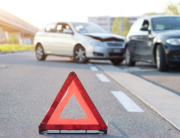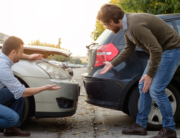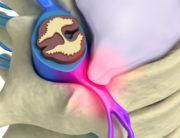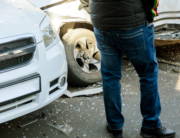Despite your best efforts to avoid it, you were in a car crash. After you safely and legally leave the scene of the accident, you are probably wondering what will happen next. Here is a step-by-step walk-through of what happens after a car accident in Florida and what to expect under Florida laws.
Get immediate medical attention. If you have injuries, your personal injury protection (PIP) insurance will not pay the medical bills unless you get the initial medical care within 14 days of the wreck. Also, it is harder to prove that your injuries were the result of the car accident if you wait to seek medical attention.
The insurance company will likely deny coverage, claiming the harm was from some other cause and not the car wreck. Signs of soft tissue injuries, internal bleeding, and even fractures can take a day or two to surface.
Notify your insurance company. Your insurance company can deny coverage if you do not notify them of the collision right away. They will assign an adjuster to the claim and start their process of investigating the accident.
Only give them the basic facts of what happened. Do not speculate about who might have been guilty of causing the crash. Do not admit any fault or express regret about the accident. The insurance company stays in business by paying out as little as possible in claims, so do not give them words they can twist and use against you.
Do not give a recorded statement until you speak with us. In a recorded statement, the insurance company will ask you many questions and record your responses. Most people are not used to speaking for recordings. They might fumble for their words and say things that can sound bad when taken out of context.
Do not give a written or recorded statement to an insurance company unless we are involved with the insurance claim ahead of time, so that we can protect you.Report the wreck to the police. You should report your accident within ten days, unless a law enforcement officer came to the scene and wrote a report. Having a police or accident report will give weight to your claim of who caused the crash. The other party to the accident can also file a report that contradicts yours, so it is critical to have your side of the story on record with law enforcement.
Let us know if insurance companies are harassing you. They may do this with phone calls or by sending you papers to sign. Once you hire a lawyer to represent you in your accident injury claim, the insurance companies are not supposed to talk directly with you. They are supposed to go through us. We will serve as your shield to insulate you from the insurance companies pressuring or harassing you.
Do not agree to a settlement until you talk with us. Insurance companies are notorious for waiving a check under a person’s nose early on, without explaining that if the injured person accepts the money, that is all the compensation they will ever receive for that wreck. You can end up with a pile of medical bills you have no way to pay if you settle too early. We can keep that from happening.
Do not sign any papers, without having us read them first. Insurance companies can trick you into signing away your rights to compensation when you do not understand what you are signing. We will review all documents carefully and let you know if it is safe to sign a document. Never sign any paper for the insurance company without letting us read it first.
Follow through on your medical treatment. If you do not complete all the medical treatments, such as physical therapy, the insurance company can blame you for not recuperating fully. They will try to discount the amount they pay you in this situation. Even though it is inconvenient and uncomfortable, make sure you attend all the appointments and follow your doctor’s instructions, not only to get better but to protect the value of your claim.
Keep a journal of what happens. Write down the date, what occurred, who said what, and who witnessed the things that happened. Do not write any editorial comments in the journal. Use a blank notebook for your journal because the judge can look through the entire notebook.
Do not write anything you would not want them to read. Try to write down your notes within a day of the events happening. Record your doctor appointments, physical therapy appointments, your level of pain, your mental anguish, medications you had to take, and other facts for your case.
We will investigate the accident. We will read the police report and verify how the collision happened. We can talk to eyewitnesses, use accident reconstruction experts, and review video evidence when appropriate.
We will collect the evidence to build your case. In addition to the police report, video evidence, eyewitness testimony, and accident reconstruction experts, we will gather your medical records, employment records (to prove your lost wages), and pull together any other relevant proof to build your case for compensation for your injuries. Sometimes we create visual evidence like charts and diagrams to help the judge understand what happened. We can go after phone records if we suspect that distracted driving was a factor in the wreck.
We will file claims and negotiate directly with the insurance companies. Your mandatory $10,000 PIP coverage and the at-fault driver’s liability coverage can both be sources of compensation. We will calculate a fair settlement amount for your injuries and losses. We will advise you if the insurer if making a “low-ball” offer or a reasonable one. We will fight to get you all the compensation you deserve.
To get the injury claim process started, call Montero Law Center at 954-767-6500. After a car accident, our law firm can give you legal advice. We will evaluate your case and let you know if you might be eligible for compensation. The initial consultation is free and with no obligation.
 English
English  Español
Español 




